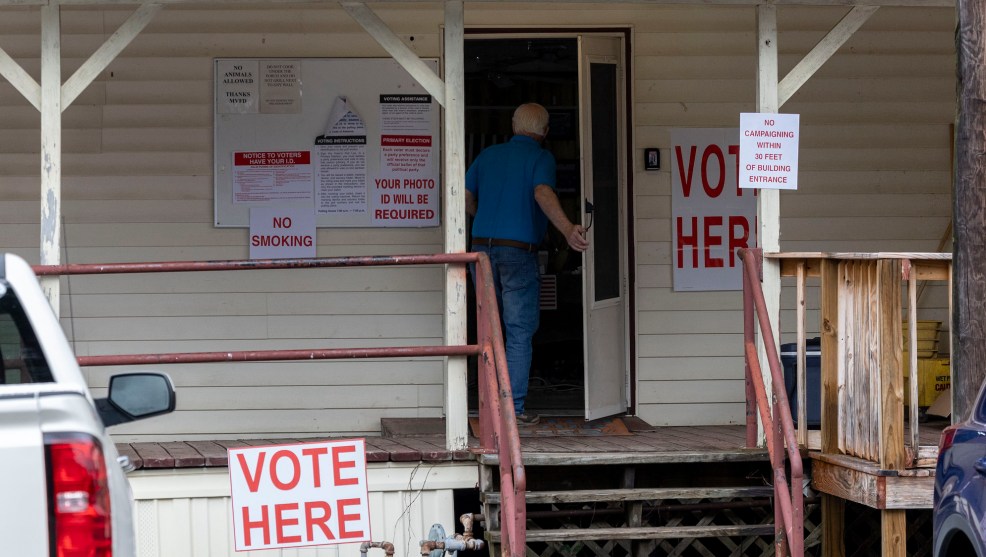
A voter enters Tuscaloosa County Ward 5, Montgomery Fire Department, to vote during a primary election, Tuesday, March 5, 2024, in Northport, Ala. Vasha Hunt/AP
Donald Trump’s claim that non-citizens are crossing the Southern border and registering to vote in US elections has become a centerpiece of his presidential campaign, even though every major study shows that non-citizen voting is exceedingly rare.
But a lawsuit filed last month shows that those false assertions of voter fraud are leading to real world instances of qualified voters being blocked from casting a ballot.
On August 13, Alabama Secretary of State Wes Allen, an election denier who supported Trump’s attempt to overturn the 2020 results, announced that his office had identified 3,200 alleged noncitizens who had registered to vote in the state and had begun removing them from the voter rolls. He said the names were pulled from a list of individuals who had received noncitizen identification numbers from the Department of Homeland Security. Even then, he conceded that “it is possible that some of the individuals who were issued noncitizen identification numbers have, since receiving them, become naturalized citizens and are, therefore, eligible to vote.”
On September 27, the Department of Justice sued Alabama, arguing that Allen’s actions were in violation of the National Voter Registration Act of 1993, which prohibits the removal of voters from the rolls within 90 days of an election. That so-called quiet period exists “to mitigate the risk that errors in systematic list maintenance will disenfranchise, confuse, or deter eligible voters by ensuring that they have adequate time to address errors and understand their rights,” the Justice Department wrote in its lawsuit.
But the timing of the purge wasn’t the only issue. According to the DOJ, of the 3,251 individuals identified as noncitizens by Alabama, 717 had proven their citizenship and re-registered to vote after ending up on the secretary of state’s list. That meant the eleventh-hour voter purge had an error rate of more than 22 percent. The DOJ said that in Alabama “potentially several hundred or even thousands more registered, eligible voters from the list—U.S. citizens—remain in inactive status, stand to be harmed, and risk disenfranchisement just weeks before the upcoming federal election.”
Crackdowns on alleged non-citizen voters frequently ensnare naturalized US citizens or even those who have been citizens since birth, due to sloppy methodology by partisan election officials. William Pritchett of Montgomery County told NPR he’d received a letter from the state recently saying his registration was being canceled even though he was born in Alabama and has always been a US citizen.
In 2019, Texas attempted to remove nearly 100,000 alleged noncitizens from the voter rolls. Trump claimed the state’s list proved that “Voter fraud is rampant.” But election officials quickly uncovered that many of the supposed noncitizens targeted for removal were actually naturalized US citizens. A federal judge halted the purge, the Republican Secretary of State was forced to resign, and his director of elections admitted in legislative testimony that 25,000 US citizens were wrongly targeted.
The Texas debacle should have been a cautionary tale. But instead Trump and his allies continue to double down on outright lies and accelerate their voter suppression efforts, even though they’ve yet to uncover any evidence of non-citizen voting or registration on even a minor scale.
What’s more, Republican-controlled legislatures have placed initiatives on the ballot in eight states this November mandating that only US citizens can vote in state elections. That is already the law, but these ballot initiatives would further Trump’s lies about voter fraud and could lay the groundwork for future restrictions on ballot access that could stymie eligible voters, such as requiring proof of citizenship, like a passport or birth certificate, to register to vote. And the conservative group Look Ahead America just posted billboards in Arizona and Nevada of a man in handcuffs with the tagline, “if you are not a citizen, voting is a crime.” That could intimidate legal voters in Latino communities, suggesting they may be hassled if they show up to vote and that this might even affect relatives who are not documented.
Republicans are pushing these tactics despite the fact that they continue to fail to dig up instances of widespread voter fraud. Trump’s own “commission on election integrity,” which the president formed after he claimed he lost the popular vote in 2016 due to 3 million illegal votes, disbanded without finding any proof of voter fraud. More recently, the North Carolina board of elections last month announced it had removed 750,000 ineligible registrations from the state’s voter rolls since the beginning of 2023, mostly because people had moved, died, or hadn’t voted in recent elections. Yet, as this major investigation, the board uncovered only nine potential non-citizens who were registered to vote—out of 7.7 million total voters in the state.

















